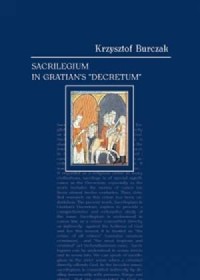
| Dane szczegółowe: | |
| Wydawca: | Katolicki Uniwersytet Lubelski, KUL |
| Rok wyd.: | 2012 |
| Oprawa: | twarda |
| Ilość stron: | 314 s. |
| Wymiar: | 176x250 mm |
| EAN: | 9788377025338 |
| ISBN: | 978-83-7702-533-8 |
| Data: | 2013-02-14 |
Opis książki:
List of Abbreviations
Introduction
Chapter 1
The Concept and Nature of sacrilegium
1.1. The Etymology of the Concept of sacrilegium
1.2. Sacrilegium in the Greek Civilization
1.3. Sacrilegium in the Roman Empire
1.4. In the Old Testament
1.5. Sacrilegium in the Christian Religion
1.5.1. The New Testament
1.5.2. The Church Fathers and Writers of the Church
1.6. The Canonists on the Nature of Crime and sacrilegium
1.7. Definitions of sacrilegium in Gratian s Decretum
1.8. Summary
Chapter 2
The Typology of Subjects Committing sacrilegium
2.1. The Subject in genere
2.2. The Subject in specie
2.2.1. The Clergy
2.2.1.1. The Clergy Using Goods Dedicated to the Poor
2.2.1.2. Bishops, Presbyters and Deacons Acting against the Power of the King
2.2.1.3. Bishops, Presbyters, Deacons and Other Clerics Seeking Soothsayers Advice
2.2.1.4. The Presbyter
2.2.1.4.1. Priests Receiving Only the Body of Christ during Holy Mass
2.2.1.4.2. Priests and Deacons Returning from Heretics
2.2.1.4.3. Priests and Deacons Selling Liturgical Vessels
2.2.1.5. Subdeacons and Deacons Breaking Celibacy
2.2.2. The Laity
2.2.2.1. Keeping Tithes
2.2.2.2. Killing the King
2.2.2.3. Taking Away Property and Privileges
2.2.2.4. Usurpation of Power over Ecclesiastical Property
2.3. Summary
Chapter 3
The Object of sacrilegium
3.1. Material Goods of the Church
3.1.1. Selling Ecclesiastical Possessions
3.1.2. Seizure of Ecclesiastical Possessions
3.1.3. Seizure of Ecclesiastical Property
3.1.4. Taking Away What One Has Donated to the Church
3.1.5. Theft of Ecclesiastical Money
3.1.6. Misappropriation of Things Handed Over to Places of Worship
3.1.7. Keeping Offerings of the Deceased Who Donated Them to the Church
3.1.8. Changing the Purpose of Church Offerings
3.1.9. Deceitful Theft of Ecclesiastical Things
3.1.10. Stealing Anything from a Church ( furtum, peculatus, sacrilegium )
3.1.11. Seizure of Anything Consecrated to God
3.1.12. Appropriation of Goods Belonging to a Dying Bishop
3.1.13. Raiding a Church and a Monastery
3.1.14. Ravaging Lands in Ecclesiastical Use
3.1.15. Levying Extraordinary Burdens on Ecclesiastical Possessions
3.2. Religion and Unity of the Church
3.2.1. Apostasy
3.2.2. Heresy
3.2.3. Schism
3.3. Holy Orders and Ecclesiastical Offices
3.3.1. Simony
3.3.2. Episcopal Orders
3.3.3. Hindering the Administration of Churches
3.4. Violence towards the Clergy and People Consecrated to God
3.4.1. Assault on Bishops or Presbyters
3.4.2. Violence towards Clerics or Monks
3.4.3. Defiling Women Consecrated to God
3.4.4. Breaking Church Asylum
3.5. Crime against Spiritual and Secular Power
3.5.1. Arguing with the Pope s and Emperor s Decisions
3.5.2. Murder of a Criminal
3.6. Unlawful Relationships
3.6.1. Relationships between Men and Women Religious
3.6.2. Abusing the Blessing of an Engaged Couple
3.7. Relations with Jews
3.7.1. Entrusting Public Offices to Jews
3.7.2. Feasts with Jews
3.8. Magic
3.9. Unfair Sentence
3.10. Summary
Chapter 4
Guilt
4.1. Dolus
4.1.1. The Nature of Guilt in the Alienation of Ecclesiastical Goods
4.1.2. The Guilt of Those Who Broke the Right of Asylum
4.1.3. Apostasy, Heresy and Schism
4.1.4. The Principal
4.1.5. Holy Communion under One Kind
4.1.6. The Administration of Churches
4.1.7. Abuse of Power and Moral Complicity in a Crime
4.1.8. Sacrilegium versus fornicatio
4.1.9. Sacrilegium versus furtum
4.1.10. Sacrilegium versus parricidium
4.1.11. Complicity in a Crime
4.1.12. Usurpation of Ecclesiastical Goods
4.1.13. The Laity and Ecclesiastical Goods
4.1.14. The Guilt of a Community
4.1.15. Consecrated Persons
4.1.16. Celibacy
4.1.17. The Guilt of Entrusting Public Offices to Jews
4.1.18. The Guilt of Abusing the Blessing of an Engaged Person
4.1.19. Simony
4.1.20. Unfair Sentence
4.1.21. The Necessity of Jurisdiction
4.1.22. Personal Responsibility
4.1.23. Levying Extraordinary Burdens on Churches
4.1.24. Magic
4.2. Culpa
4.3. Summary
Chapter 5
Criminal Sanctions
5.1. Censures
5.1.1. Anathema
5.1.2. Excommunication
5.1.3. Interdict
5.1.4. Suspension
5.2. Expiatory Penalties
5.2.1. Deposition and Degradation
5.2.2. Canonical Sentence
5.2.3. Incapacity to Receive Orders
5.2.4. Infamy
5.2.5. Incapacity to Perform Actions in Civil Proceedings
5.2.6. Exile
5.2.7. Imprisonment
5.2.8. Flogging
5.2.9. Proscription
5.2.10. Financial Penalty
5.2.11. Capital Punishment
5.3. Canonical Penance
5.4. Summary
Chapter 6
The Application and Cessation of Penalties
6.1. Latae sententiae Penalties
6.2. Ferendae sententiae Penalties
6.3. Bodies Imposing Penalties
6.3.1. The Pope
6.3.2. Bishops and Synods
6.3.3. Secular Power
6.4. The Cessation of Penalties
6.4.1. The Bishop s Absolution on the Usual Conditions
6.4.2. Reservation of the Right to Absolve
6.4.3. Danger of Death
6.5. Other Ways in Which Penalties Cease to Apply
6.6. Summary
Conclusion
Bibliography
Książka "Sacrilegium in Gratians Decretum" - ks. Krzysztof Burczak - oprawa twarda - Wydawnictwo Katolicki Uniwersytet Lubelski, KUL. Książka posiada 314 stron i została wydana w 2012 r. Cena 42.90 zł. Zapraszamy na zakupy! Zapewniamy szybką realizację zamówienia.

